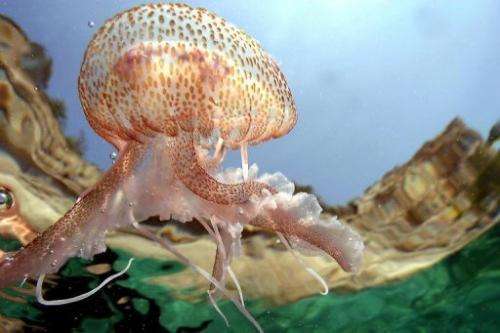A jellyfish (Aurelia Aurita - Familia: Ulmariidae) pictured in the sea near the Turkish town of Kemer on June 8, 2004. The United Nations on Thursday warned overfishing in the Mediterranean was boosting jellyfish, which reduce stocks further and it called for jellyfish to be used in food, medicine and cosmetics.
The United Nations on Thursday warned overfishing in the Mediterranean was boosting jellyfish, which reduce stocks further and it called for jellyfish to be used in food, medicine and cosmetics.
A study by the UN's Food and Agriculture Organisation (FAO) in Rome said overfishing had increased the number of jellyfish because it had removed their main predators from the food chain.
In a "vicious circle", the jellyfish then feed on fish larvae and young fish "and further reduce the resilience of fish populations," the report said.
It pointed out that fish stocks had still not recovered from a surge in the mauve-coloured Pelagia jellyfish in the Adriatic 20-30 years ago.
The report pointed to other possible factors behind the growing number of jellyfish besides overfishing, including global warming and the increase in fertilizers and sewage in the water which increases the nutrients for jellyfish.
It suggested that among the ways to reduce the jellyfish populations in the Mediterranean could be increased use of medusae as food or medicine.
It also said that the discovery of an "immortal jellyfish", which is capable of reversing its ageing process, held out the promise of developing powerful rejuvenation products for humans.
© 2013 AFP






















